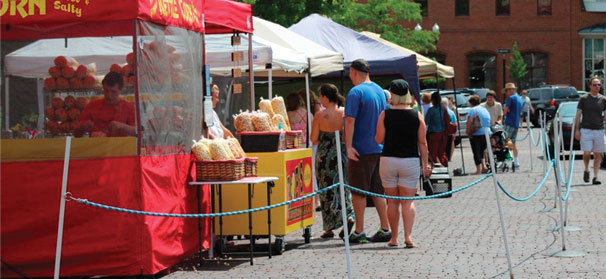

Aug 15, 2012Vegetables coming to market despite drought
Vegetable growers seem to be holding their own, despite what many are describing as the worst drought since the days of the Dust Bowl.
While some areas were seeing a diminished crop in July, farmers’ market vendors and on-farm marketers were doing OK. Access to water was key to the success stories.
“We are seeing heat stress in some of our crops,” said Lisa Schacht, owner of Schacht Farm and Farm Market in Canal Winchester, Ohio, and president of the Ohio Produce Growers and Marketers Association. “However, we have been aggressively irrigating and not experiencing any shortage.”
It was Schacht’s understanding that the southwest portion of Ohio was having considerable shortages in green beans and sweet corn. However, Ohio tomato production seemed strong.
“From my business associates that sell at the local farmers’ markets, I have heard that attendance of vendors has been normal,” Schacht said.
Illinois has been hit hard by the drought this season, and fruit growers – already suffering from the spring freezes – took the brunt.
“We did lose one peach grower, and the local apple production is down because of trees blossoming in March and a hard frost in the middle of April,” said Heidi Maschmann, manager of the Woodstock Farmers Market in Woodstock Ill. “The rest of our vendors are hanging in there and several have irrigation. Some have big irrigation systems; two use a nearby creek. One of our produce farmers has a point (driven well) on his property and another has some drip lines. All the rest of our farms have wells, which are being heavily used.”
In New York, most fresh-market growers have been running irrigation non-stop, said Steve Reiners, a vegetable crop professor with Cornell University. Where irrigation was utilized, the quality of vegetables has often been very good, he said.
“Lots of sunshine with just enough water applied is leading to a vintage year in terms of taste of everything from sweet corn to melons,” he said, “and so far we don't have the disease problems we normally see in wet years.”
Lower yields?
Across the country, crops that matured during the height of the drought had the biggest yield problems, Reiners said.
“My growers have said the yields are down a bit and some vegetables are smaller, size-wise, but we’ve got all the vegetables we planned on,” said Bob Benson, owner of Bob’s Barn Farm Market & Bakery in Coloma, Mich. “Fruit has been another story. The berries have been smaller, but the sugar is up so they are sweeter.”
The hot weather led to concerns for growers of pumpkins and fall squash, said Ron Goldy, Michigan State University Extension specialist. It caused more male than female flowers to be produced. Cooler temperatures should bring on more female flowers. Growers should consider removing fruit that is already turning orange to encourage the plants to produce more flowers. Virus symptoms are also increasing in most vine crops, he said.
“I would say we have a good selection of vegetables and are lucky to have a diversity of farmers with different sources of water,” Maschmann said. “All of the yields are down, of course, but I do think our market still has an excellent selection of vegetables. We also have a vendor with first-pick frozen blueberries from Michigan, which has added to the available options this season.”
“Our vendors were first hit with frost and freeze early in the season, and we received reports from vendors who lost peaches and strawberries,” said Kristi Jones, a bureau chief with the Illinois Department of Agriculture. “In regard to the drought, we have not had any growers ‘drop out,’ but we have had a small amount of growers miss a week here or there due to a lack of a product.”
The drought also has been a distraction for vendors who raise livestock, Jones said.
“These producers may have to miss a night of the market because it is vital to do other activities on the farm, such as haul water to their animals during the record-breaking heat,” she said.
Many growers use vegetables to have a full season of produce to sell. Some of these growers are having a tough year.
Larry DeVoe, 80, owner of DeVoe’s Rainbow Orchard in Halfmoon, N.Y., said this is probably the worst year he’s experienced as a grower.
“Over the years we’ve had some frost and some severity, depending on the spring and that sort of thing, but I always had the vegetables to fall back on,” DeVoe said. “This year, the vegetables are terrible.”
Due to a serious lack of rain, DeVoe was expecting to harvest roughly 10 percent of the early sweet corn he had planted. He doesn’t use any irrigation, because in normal years it is not needed.
“I think from here on out we’ve got to get enough rainfall to keep the top moisture,” he said.
— Derrek Sigler
none














